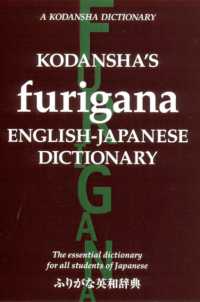- ホーム
- > 洋書
- > 英文書
- > Religion / Ethics
基本説明
Deconstructs the myths that America was either a Christian nation bent on perpetuating Protestant ideals against all Catholic newcomers or a secular nation.
Full Description
America's most original legal invention may be the First Amendment guarantee that ''Congress shall make no law respecting an establishment of religion.'' This constitutional provision rejected the millennium-old Western policy of supporting one form of Christianity in each nation and subjugating all other faiths. It was both original and deeply challenging. The new nation encountered difficulty removing the traditional laws that controlled religious doctrine, liturgy, and church life and that discriminated against unpopular religions, and found it even harder to decide more subtle legal questions that continue to divide Americans today: Did the constitutional prohibition on establishment of religion prohibit governmental support for religion altogether, or did it just bar preferential support for some religions over others? Did it require that government remove Sabbath day, blasphemy, oath-swearing and other laws historically rooted in religion, or could those laws now be justified on grounds of tradition, morality, or utility? Did it mean the removal of all religious texts, symbols, and ceremonies from public documents and government lands, or could a democratic government represent these in ever more inclusive ways? Did the First Amendment Establishment Clause bind only "Congress " or were state and local governments bound, too?
This twelve essays of this volume examine the diverse and shifting answers to these questions from the founding era until modern times. They show how the eighteenth-century founders took the first decisive steps toward disestablishment of religion, but with diverse political, theological, and philosophical goals in mind. No Establishment of Religion also shows how America's ongoing battles over religion and education, immigration, polygamy, religious funding, religious exemptions, and more have made the original and evolving understanding of disestablishment of religion a source of perennial cultural and constitutional controversy. The authors of the essays stake out strong and sometimes competing positions on what ''no establishment of religion'' meant to the American founders and what it can and should mean for America today. They represent a wide array of perspectives on the genesis and genius of America's original contribution to religious liberty, exposing the fallacies of viewing America as either a Christian nation bent on perpetuating biblical ideals or a secular nation built with a high and impregnable wall of separation between church and state.
Contents
Acknowledgements ; List of Contributors ; Introduction - John Witte, Jr. ; 1. The Separation of Church versus Religion in the Public Square: The Contested History of the Establishment Clause - T. Jeremy Gunn ; 2. Establishment at the Founding - Michael W. McConnell ; 3. Disestablishing Religion and Protecting Religious Liberty in State Laws and Constitutions (1776-1833) - Mark D. McGarvie ; 4. Roger Williams and the Puritan Background of the Establishment Clause - David Little ; 5. Toleration and Diversity in New Netherland and the Duke's Colony: The Roots of America's First Disestablishment - Paul A. Finkelman ; 6. James Madison, Thomas Jefferson, and the Meaning of "Establishment of Religion" in Eighteenth-Century Virginia - Ralph Ketcham ; 7. The Continental Congress and Emerging Ideas of Church-State Separation - Derek Davis ; 8. The First Federal Congress and the Formation of the Establishment Clause of the First Amendment - Carl H. Esbeck ; 9. Defining and Testing the Prohibition on Religious Establishments in the Early Republic - Daniel L. Dreisbach ; 10. The Second Disestablishment: The Evolution of Nineteenth-Century Understandings of Separation of Church and State - Steven K. Green ; 11. Disestablishment from Blaine to Everson: Federalism, School Wars, and the Emerging Modern State - Thomas C. Berg ; 12. Some Reflections on Fundamental Questions About the Original Understanding of the Establishment Clause - Kent Greenawalt ; 13. Getting Beyond the "Myth of Christian America" - Martin E. Marty ; Bibliography ; Index








